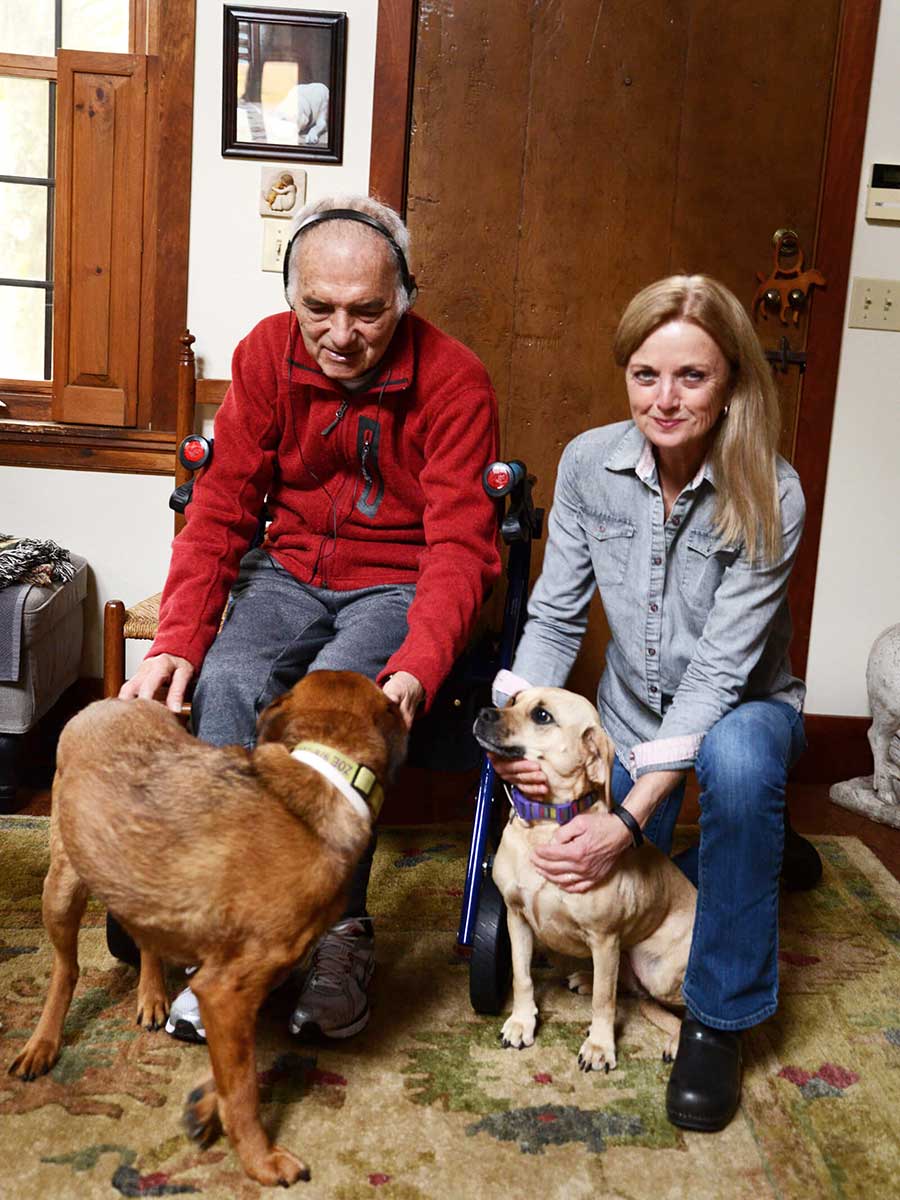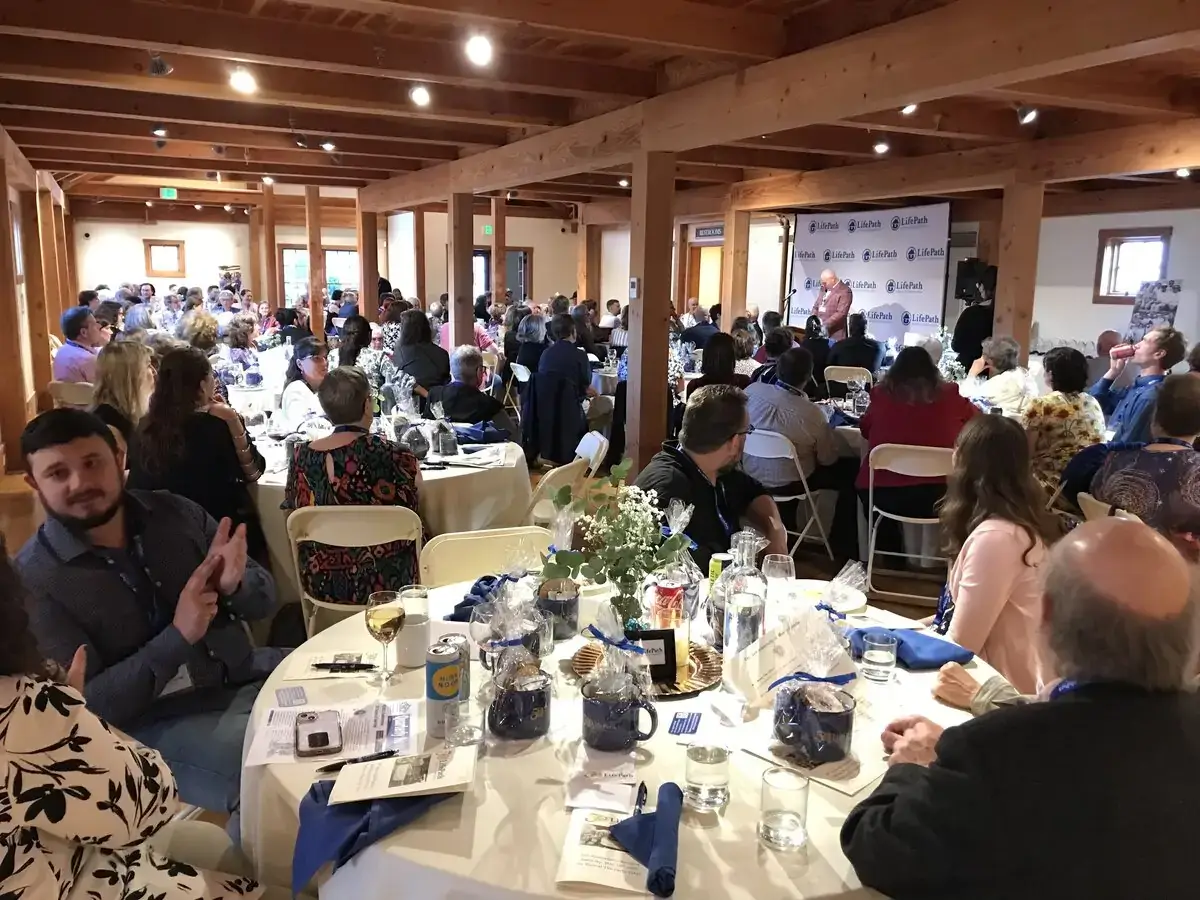Alan and Deb Bachrach are shown above enjoying the company of their dogs, Bela and Zoe, in 2017. Alan is listening to music on his iPod, provided through a partnership with the Alzheimer’s Music Project. Alan, who had dementia with Lewy bodies, found the music to be soothing and often sang along.
Aging in place with dementia support services
Alan Bachrach lived with his wife Deb in Petersham, in a home filled with their love of animals and each other. “Alan was a veterinary ophthalmologist,” says Deb, “and, like most veterinarians, that was his life.”
Their restored 260-year-old home features outbuildings for the veterinary practice and their many animals, including dogs, cats, llamas, goats, and sheep. “A lot of our hobbies were based around animals,” says Deb.
While he was still practicing, Alan began to show signs of dementia. “The first sign that I noticed was that he was having trouble following a complex story,” says Deb, “and then I noticed when I would go over patient history in the office, he wasn’t always paying attention. He wasn’t able to follow. And then the next thing I noticed, he was having a really difficult time keeping up with notes.”
After initially working with Alan’s primary care physician, for a couple of years Alan was treated for depression, but eventually further evaluation led to a diagnosis of dementia with Lewy bodies. “He’s a really, really bright, very well-educated person,” says Deb, “and I think that probably masked things for a long time.”
Deb sought help to be able to care for Alan, who needed 24/7 assistance, at home. In addition to support from the Visiting Nurse Association, Deb found her way to LifePath. “When I knew the organization as Franklin County Home Care,” says Deb, “I thought it was Meals on Wheels. As I looked further into LifePath, I realized just the array of services that were available.”
A case manager from LifePath met with the couple and offered assistance through dementia coaching and additional support services and resources for both Alan and Deb as his caregiver.
Deb had spent time caring for her mother, who had Alzheimer’s disease, but “caring for my mother is quite different than caring for a spouse,” says Deb. Dementia Coach Linda Puzan helped Deb to learn more about caring for someone with dementia with Lewy bodies in particular. “This is such a different disease that the tricks that we knew were helpful with my mom were not helpful with Alan.”
Linda helped Deb to think about ways to increase Alan’s safety, such as making the home safer with some dementia equipment such as door chimes, door locks, and stop signs for when he was walking around the house. “We did have a little bit of trouble with wandering,” says Deb. Ideas like these helped Deb to feel “more at ease” and less anxious while she went about her day.
Also helpful to Deb’s wellbeing as a caregiver was the Dementia Caregivers Support Group, available remotely and in-person through LifePath. “I think the nicest thing about support groups is you can share whatever you want to share,” says Deb. “And these are people that are having the same experiences. It’s really tough for me to explain to our friends and some of our relatives because they’re not in it. To be able to talk with someone who’s in it, we can trade stories and things that work and things that don’t work.”
Linda also recommended a way to help stimulate Alan’s mind and improve his mood.
At that time, Alan was speaking only in very short sentences and was having difficulty staying engaged at home. “Alan has always been known as the class clown,” says Deb, sharing photos of Alan dressed up in fun and creative costumes. “He used to read nonstop when he wasn’t at work. He stopped reading, stopped listening to music. That was I think because he couldn’t figure out how to turn the CD player on.”
Linda connected Deb and Alan to Peter Acker from the Alzheimer’s Music Project, which provides iPods loaded with customized playlists to people living with dementia. “I gave her genre-specific artists that I knew Alan would like to listen to. She then sent that list along to the folks at the Alzheimer’s Music Project,” says Deb. “The night this thing arrived, at first, Alan was really apprehensive because anything electronic had really been throwing him lately. And he’s never been a tech whiz at all; like, the simplest of simple is good for him. So he was really nervous about it.”
Peter went over instructions for how to operate the little iPod. “He put the earphones on, and Alan went from saying nothing to within a couple minutes singing along,” says Deb. “There’s Alan with the headset on singing and smiling, just a completely different person.” Alan went from occasionally speaking in short sentences and mostly sleeping to listening and singing along to his favorite songs for hours on end.
After gaining a better understanding of dementia with Lewy bodies and feeling more supported in her role as a caregiver, Deb says she felt like things settled into a more supportive routine for herself, which in turn benefited Alan. “He had a remarkable little rally this summer,” says Deb, “and I am thankful for every second of it.” The home felt more relaxed again, and Alan started sleeping better. In May and June of this past summer, he began to have better days, common with dementia with Lewy bodies, with its symptoms that Deb says “wax and wane.” Alan and Deb were even able to go out to dinner.
Until the end, all of these services helped to keep Alan at home, where he wanted to be.
Alan Bachrach passed away at the end of the summer. He is missed by his family and many friends, animal and human alike.





